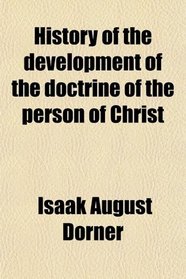Search -
History of the development of the doctrine of the person of Christ
History of the development of the doctrine of the person of Christ
Author:
Purchase of this book includes free trial access to www.million-books.com where you can read more than a million books for free. This is an OCR edition with typos. Excerpt from book: SECTION III. CHRISTOLOGICAL MOVEMENTS, OF THE TYPE OF THE PERIOD OF THE REFORMATION, OUTSIDE OF THE CHURCH. Nothing can more clearly show what was, and mus... more »
Author:
Purchase of this book includes free trial access to www.million-books.com where you can read more than a million books for free. This is an OCR edition with typos. Excerpt from book: SECTION III. CHRISTOLOGICAL MOVEMENTS, OF THE TYPE OF THE PERIOD OF THE REFORMATION, OUTSIDE OF THE CHURCH. Nothing can more clearly show what was, and mus... more »
ISBN-13: 9780217935289
ISBN-10: 0217935281
Publication Date: 8/18/2009
Pages: 324
Rating: ?
ISBN-10: 0217935281
Publication Date: 8/18/2009
Pages: 324
Rating: ?
0 stars, based on 0 rating




